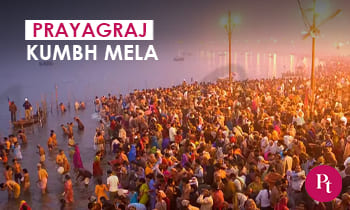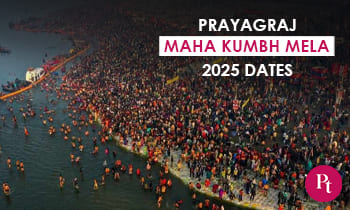The biggest gathering of Hindus, the Kumbh Mela will be held in Prayagraj, bringing together millions of devotees in 2025. Over the last 12 years, the Kumbh Mela has been organized in four Indian cities namely Haridwar, Prayagraj, Nashik, and Ujjain.
It is also popularly known as the Great Kumbh or Purna Kumbha. There is also an intermediate version called the Ardh Kumbh held every six years but only in Prayagraj and Haridwar.
Kumbh Mela isn’t only a place of salvation for people, but a celebration of the culture and tradition of Indians across all sections of society. Many who visit say it’s about getting to that happy place, mixing with people with diverse cultures that have existed before and that have contributed to the present.

Story behind the Prayagraj Maha Kumbh Mela
The story behind the Kumbh Mela is associated with the ancient epic tale known as the Samudra Manthan or ‘churning of the ocean.’ According to the legend, there was a pot full of Amrit “the nectar of life” believed to offer immortality to those who drank it.
The gods and demons quarrelled over the vessel, and during the fight, Lord Vishnu, who appeared as a female named Mohini, ran off with it. During her quest some of the nectar dropped on the lands of the four cities; Haridwar, Prayagraj, Nashik, and Ujjain making these locations holy.
According to traditional beliefs, Kumbh Mela is held when Jupiter transits into Aquarius (Kumbh Rashi) and the Sun moves into Aries (Mesh Rashi) or Pisces (Meen Rashi). This alignment of planets is believed to increase spiritual energy, helping pilgrims grow spiritually.
The main attraction of the Kumbh Mela is the Shahi Snans, or Royal Baths, performed by the Akharas. The Hindu lunar calendar schedules these special baths on key dates. Millions of pilgrims attend these royal baths to wash away their sins and attain salvation.
Following is the schedule for Shahi Snans and other big holy dips for the devotees visiting in Maha Kumbh Mela in 2025:
- Makar Sankranti -The first royal bath will be held on Makar Sankranti when the Sun moves into Capricorn on January 14, 2025.
- Mauni Amavasya (second Shahi Snan) – It will fall on January 29, 2025, The second most auspicious royal bath is held on this day, known as the Mauni Amavasya, believed to be one of the most propitious days for meditation and bathing.
- Basant Panchami (3rd Shahi Snan) – The third essential date of Kumbh Mela is February 3, 2025 for the third Shahi Snan or royal bath falls on the day of Basant Panchami, marking the start of spring and honouring Goddess Saraswati.
Besides these royal baths, there are several other bathing days during Kumbh Mela:
- Paush Purnima-13th January 2025: On this full moon day in the Hindu month of Paush, pilgrims gather to bathe seeking blessings and cleansing.
- Achla Saptami – 4th of February 2025: It is believed that bathing on this seventh day of the waxing moon in Magha brings many rewards for penance.
- Maghi Purnima – February 12, 2025: Again a complete moon bath in which devotees plunge for blessings and divine graces. Maha Shivratri, 26 February 2025, this date will mark the end of Kumbh Mela. On this day, Lord Shiva is worshipped with prayers and by keeping a fast.
Preparations for the Kumbh Mela are in full swing with the focus being on the safety, comfort, and spiritual satisfaction of all the devotees. The higher authorities are also planning infrastructures, sanitation, crowd control, and other logistics in order to make the spiritual experience hassle-free for millions of tourists expected to travel. This Kumbh Mela is expected to be a bigger and better manifestation of religion, arts, and customs.











 Call
Call WhatsApp
WhatsApp Enquiry
Enquiry